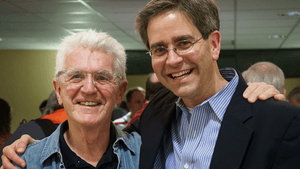Stay in the Loop
BSR publishes on a weekly schedule, with an email newsletter every Wednesday and Thursday morning. There’s no paywall, and subscribing is always free.
Passing the baton with style
Paul Rardin ends first season at Mendelssohn Club with "Alleluias for Alan"

Paul Rardin finished his first season as artistic director of the Mendelssohn Club with a program that conveyed two hopeful messages: the grand tradition of English choral music is still healthy and the grand Philadelphia tradition of volunteer choruses seems to be in good shape, too.
Rardin supported those cheering ideas with a program that began with pieces by two twentieth century English masters and ended with a piece by a younger English composer who is still alive and productive. In between, he premiered the last two “Alleluias for Alan” composed in honor of his predecessor, Alan Harler. Harler retired last year, after 27 years at the helm of the Mendelssohn Club, and the club commissioned a group of alleluias created by some of the Philadelphia composers who benefited from his championship of new music and innovative approaches.
Rachmaninoff is supposed to have cried when he heard the opening piece, Vaughan Williams’ Serenade to Music. I could believe that as soon as violinist Samuel Nebyu played the first tender notes of the violin and piano accompaniment. Serenade to Music takes its text from the discourse on music in The Merchant of Venice, and Vaughan Williams’ music is a perfect partner for Shakespeare’s evocation of moonlight, music, and young love.
Benjamin Britten’s "Choral Dances" from Gloriana is a group of choruses from an opera about Elizabeth I, taken from a scene in which the people of Norwich entertain the queen during a royal visit. Britten wrote the opera in 1953, for the coronation of Elizabeth II, and it ends with the villagers singing music that expresses a gentle confidence in their new queen. The dances are tied together by a narration that tenor David Kohn delivered with notable authority. A harp (played by Adrienne Knauer) added touches of atmosphere.
Good as those items were, I took in this concert primarily because I wanted to hear something by the third English composer, Jonathan Dove. At the last Bach at Seven program, Matthew Glandorf played a Dove piece that immediately made me want to hear more of his work. A little web research magnified my interest. Dove has become a popular composer with choral groups, even though he still hasn’t achieved much name recognition among Philadelphia audiences.
I’m happy to report I wasn’t disappointed by Dove’s The Passing of the Year, a seven part ode on the passage of the seasons, with texts by a roster of poets that includes Emily Dickinson, William Blake, and Alfred Lord Tennyson. Like Britten and Vaughan Williams, Dove treats the chorus the way good composers treat the orchestra, creating textures and special effects with the colors and special qualities of the different vocal sections. When I talked to two of the choristers during the reception that followed the concert, they both said they found something new in Dove’s score every time they rehearsed it.
Dove also understands the importance of variety. In the Emily Dickinson sequence, nervous rhythms alternated with grander material, and Donald St. Pierre’s piano accompaniment ranged from the harplike to the rumbling. In the final section, Tennyson’s New Year poem, "Ring Out Wild Bells," the musical setting mirrored Tennyson’s four-square verbal rhythms.
The two local composers were limited to short pieces on a one-word text but they proved to be just as inventive as the British team. James Primosch built his Alleluia on a ground, a bass melody that is repeated as the piece runs through a series of variations. Robert Maggio unified his salute to Alan Harler with a rhythmic pattern rather than a melody.
Both composers possess a good feel for interesting closures. Maggio’s "Alleluia" reached a climax with an increase in intensity rather than volume. Primosch finished with a burst from the sopranos followed by a quiet ending.
Our volunteer choruses are some of Philadelphia’s cultural treasures and they’ve become even more important now that we’ve lost our professional chorus, the Philadelphia Singers. The singers in choruses, such as the Mendelssohn Club and Choral Arts Philadelphia, sing for free but they audition for the opportunity and most of them have trained voices and years of experience. If the volunteer choruses didn’t exist, Philadelphia’s music enthusiasts would never hear live performances of the pieces sung at this concert. Most of us wouldn’t even know they exist.
What, When, Where
Mendelssohn Club: Dove, The Passing of the Year. Vaughan Williams, Serenade to Music. Britten, "Choral Dances" from Gloriana. Maggio, Alleluia. Primosch: Alleluia on a Ground. Donald St. Pierre, piano. Paul Rardin conductor (with Assistant Conductor Ryan Tibbets conducting Serenade to Music). May 1, 2016 at the Lutheran Church of the Holy Communion, 2110 Chestnut Street, Philadelphia. (215)735-9922 www.mcchorus.org.
Sign up for our newsletter
All of the week's new articles, all in one place. Sign up for the free weekly BSR newsletters, and don't miss a conversation.
 Tom Purdom
Tom Purdom